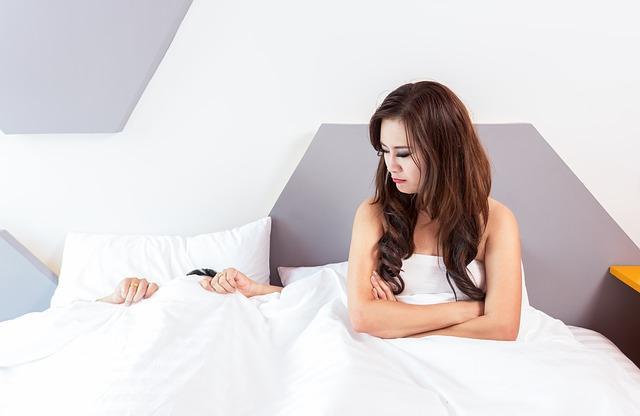Have you ever woken up in the middle of the night to your partner suddenly groaning or even squeaking in their sleep?
Or maybe your partner has complained that you are loudly moaning in your sleep, and wishes you would stop. You don’t recall having a weird dream or nightmare, so why are you making these strange noises?
As it turns out, your nightly groans may actually be the result of a serious sleep disorder known as catathrenia.
Let’s take a look at what exactly this disorder is, what causes it to develop, and how you can treat it.
Contents
What is Catathrenia?
Catathrenia, otherwise known as nocturnal groaning, is classified as a rare sleep-disordered breathing pattern by the third edition of the International Classification of Sleep Disorders.
A sleep-disordered breathing pattern is basically a strange or abnormal pattern of breathing, which a patient may exhibit while sleeping.
In contrast, snoring is the most common type of sleep-disordered breathing pattern, and you’ll definitely have encountered it by now.
Catathrenia was formerly diagnosed as a parasomnia similar to somniloquy, or sleep talking. A parasomnia is a sleep disorder that involves strange behaviors one might perform during any point in the sleep cycle.
However, because further research has found that these instances of moaning while sleeping has nothing to do with your dreams or any psychological distress carried over from the day, they are now categorized as a sleep-disordered breathing pattern instead.
The fact that patients appear calm while they groan rather than distressed in any way helps support this position.
Keep in mind that catathrenia is not the same thing as moaning or crying out due to a nightmare, snoring, sleep apnea, night terrors, stridor (which is a high-pitched noise someone will make when there is too much airflow coming into the larynx), sleep talking, or a sign of mental instability.
Each of these conditions has their own sets of causes and symptoms that are quite different from catathrenia.
Who Is Most Likely to Suffer from Catathrenia?
Catathrenia typically starts up in childhood, though this disorder can affect anyone of any age and can start at any point in a person’s life.
Your nightly groans may even go on for years without intervention. Young men are more likely to suffer from catathrenia than any other demographic.
Researchers are still unsure why catathrenia affects some people and not others. Because this condition is not life-threatening so much as it is annoying, it is not as well-researched as some of the other sleep disorders or sleep-disordered breathing patterns, like snoring or sleep apnea.
However, this is not to say that there have not been extensive studies done on this condition – only that there are so few to work off of. In fact, the catathrenia studies that do exist have found quite a few commonalities between patients.
Causes
Studies so far have shown that patients with smaller jaws were more likely to suffer from catathrenia, and 14% of patients also report a family history of the condition.
Oddly enough, this disorder also seems to be frequent in those who participate in sports that require you to hold your breath, such as swimming or weight-lifting.
A 2008 Stanford University study, of seven female patients who suffer from catathrenia between the ages of 20 and 34, found that three of the women had parasomnia issues in childhood and six of the seven had orthodontic interventions.
They also found that five had tooth extractions during their teenage years (which itself is usually an indicator of a small jaw), and two had family histories of catathrenia.
Again, these studies are quite minor in scale, so further research is needed to pinpoint the true causes of this condition, as well as to find an all-inclusive treatment option for patients.
So far, none of the findings have linked catathrenia to any serious medical conditions.
Symptoms of Catathrenia
Unfortunately, there is no way to know if you suffer from catathrenia unless someone who sleeps near you is woken up by your groaning in the middle of the night.
The groaning is often described as sounding alarmingly sexual, or even as if you are mourning or in pain. Unlike snores, which are emitted during an inhale, catathrenia groans are let out in an exhale.
Patients will emit either a high-pitched squeaking noise or a low groan, which can last anywhere between two seconds to an entire hour in especially bad cases.
Depending on the length of your groans or the number of times a patient groans throughout the night, they may also wake up with a sore throat the next morning.
Usually, patients do not even remember that they groaned all throughout the night, nor will they be woken up by the noises they make. It is most bothersome to a partner, family member, or loved one because they are the ones that have to hear it.
A patient can emit multiple groans in succession, throughout the same sleep cycle, or off and on throughout the night.
Catathrenia typically occurs during the REM (or rapid-eye-movement) stage of sleep, but it may even occur during Stage II deep sleep as well.
This appears to be supported by the observation that tossing and turning while in deep sleep seems to halt the groans, at least for the time being.
Partners or family members who are woken up by the noise usually note that patients will inhale deeply, pause without making a noise, then let out a groan or squeak that lasts, at a minimum, two to twenty seconds.
This pattern is preceded by bradypnea breathing or deep breaths that are slow and long.
These groans can be interspersed between normal breathing patterns, and do not appear to be caused by any signs of respiratory complications or blockages.
The patient may sometimes emit another squeak or snort after groaning, too.
Here’s a video showing an example of what catathrenia sounds like.
Catathrenia Treatment
If you or a loved one believe you suffer from catathrenia, then it is best to see your doctor.
This is more for your partner or family member’s peace of mind than your own, as your nightly groans affect them most.
Diagnosis
Your doctor will ask you to estimate how long you’ve been groaning (be it months or perhaps years), ask about any medications you take, and if you currently suffer from or have a history of other sleep disorders or sleep-disordered breathing patterns.
They may also ask about your family’s history of any similar conditions as well.
Your doctor may then have you stay overnight at a sleep center to perform a polysomnogram, which is a sleep study that properly diagnoses sleep disorders.
This test will show if you have any abnormal changes to your breathing patterns throughout the night and can measure the severity of your nightly groans.
It may also help your doctor to uncover any other underlying disorders you might be suffering from.
Do not be surprised if your doctor has you fill out a questionnaire about your condition. Because catathrenia is not as extensively researched as some other sleep disorders, your case may be used to help find a catathrenia cure – or at least, a treatment plan that works for you specifically.
This questionnaire may be followed by a standard clinical examination (that will run very much like a typical visit to your doctor’s office) and a physical exam.
Your doctor will also perform craniofacial evaluations (which are examinations of the shape of your head and face to detect if any abnormality, however small, might be causing your nightly groans).
CPAP Therapy
So far, the primary treatment option for catathrenia seems to be continuous positive airway pressure therapy, or CPAP for short.
This therapy is generally used to treat sleep apnea, but it has proven to be just as effective for treating catathrenia.
During CPAP therapy, you will have to use a small CPAP machine, which provides a constant flow of air via a mask that you wear throughout the night. This air flow helps to keep your airways open, so as to prevent you from groaning.
If you also tend to snore throughout the night, CPAP therapy can reduce or even eliminate that altogether. It may help to circumvent or reduce high blood pressure as well.
This mask should fit well to your face so that no air leaks out during the night. There are three types of CPAP mask: one that fits over both your nose and mouth, one that fits just over your nose, and even one that inserts directly into both nostrils.
The mask is connected to the machine via a tube, which is long enough to let you toss and turn at night. The machine itself is relatively small and quiet, so it shouldn’t pose much of a problem for you or your partner.
You should regularly follow up with your doctor or sleep technologist to make sure the air settings on your CPAP machine are the best ones for your condition. Do not be afraid to have them adjust the initial settings they give you if you do not feel it is comfortable.
Be sure to test your machine every day before you sleep, and then use it every time you go to sleep at night and when you want to take a nap.
You should also clean your CPAP therapy mask, tubing, or other headgear given to you at least once every week. This ensures that you do not breathe in old germs or bacteria you may have left behind.
Keep in mind that CPAP therapy will not work for everyone. Indeed, some patients feel a bit claustrophobic wearing CPAP therapy masks, even the small ones that you insert into your nostrils.
Of course, you should always go with the treatment option that is best for you.
This video shows some information on sleeping with a CPAP.
Catathrenia Oral Appliances and Surgery
Some have found that additional surgical intervention or even catathrenia oral appliances help to curb their nightly moaning.
Of course, these devices are generally prescribed only if CPAP therapy proves ineffective or too uncomfortable for a patient.
Patients who did not like wearing CPAP masks found these oral appliances to be far more tolerable to wear during sleeping hours.
The downside to wearing these appliances include possible jaw pain or discomfort, soreness in your teeth or gums, or they may even cause you to drool more at night.
The Stanford study of the seven female catathrenia patients found that the four patients who underwent a combination of CPAP treatment and surgical intervention completely got rid of their nightly groans, once and for all.
Three of the four also chose to use an oral appliance after both treatments.
Block Out the Noise
Unfortunately, if none of these treatment options work and your partner, a family member, or other loved one still complains about your catathrenia, then the best option is for them to find ways to block out the noise at night.
If this does become the case, you can suggest they put up a white noise machine in your room such as a fan, humidifier, or even something that plays music to drown out your groans.
Your partner, family member, or loved one may also choose to wear earplugs, or you two can simply agree to sleep separately.
Always keep in mind that, while catathrenia may not be bothersome to you personally, your partner or family members may become sleep deprived or even develop sleep disorders of their own due to your groans.
In fact, most patients with catathrenia find that they actually get restful amounts of sleep each night while their partner or family member does not.
Conclusion
Groaning in the middle of the night can be annoying and even embarrassing, but it is also harmless to your person and easy to treat.
While there is no one catathrenia cure out there, CPAP therapy, catathrenia oral appliances, and even undergoing surgery has proven to reduce or even fully get rid of your nightly groaning problem.
If you suffer from this sleep-disordered breathing pattern, be sure to talk to your doctor, consider your options, and see this matter finally resolved.
Are you, or do you know someone who is dealing with catathrenia?









